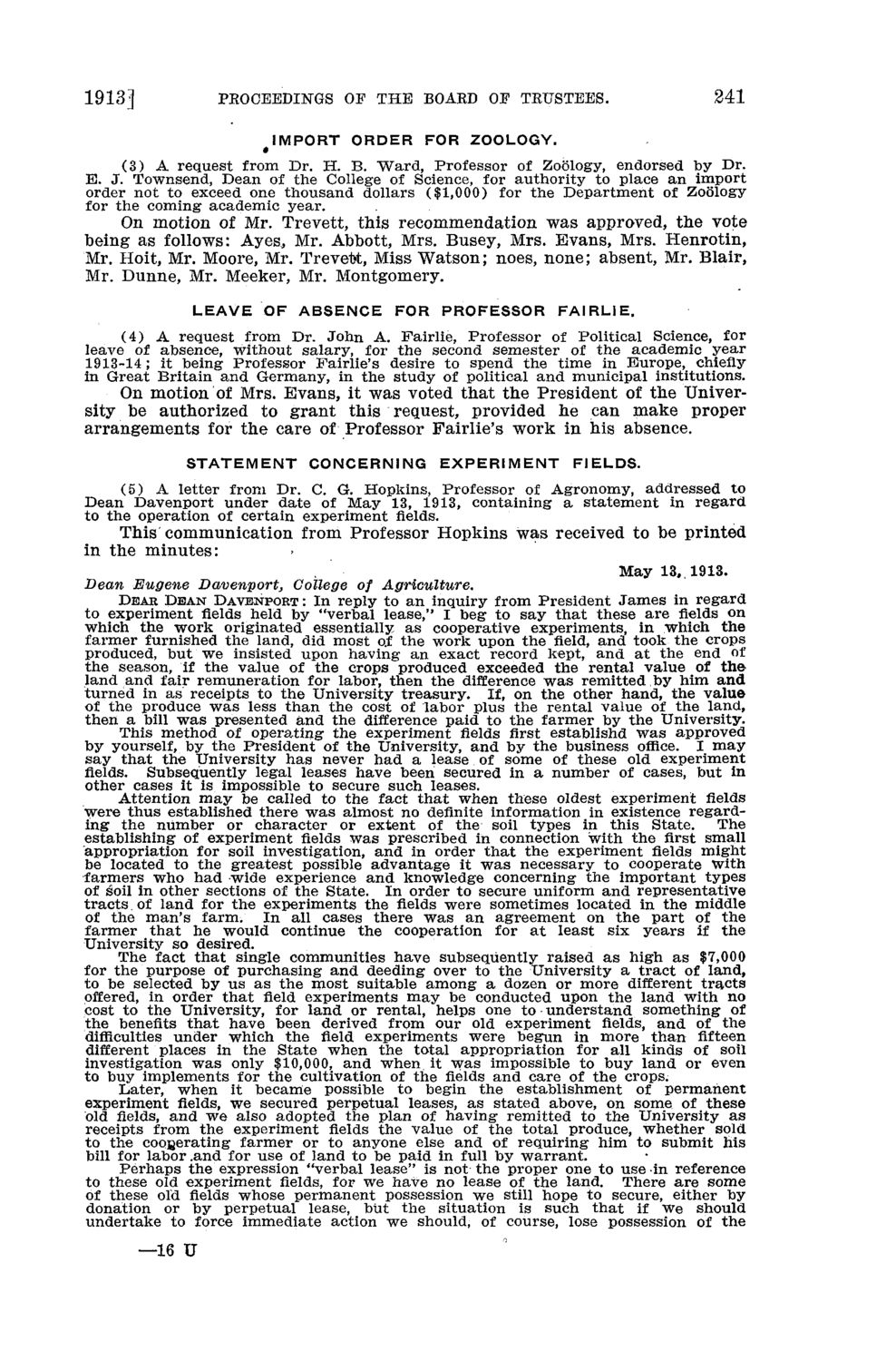| |
| |
Caption: Board of Trustees Minutes - 1914
This is a reduced-resolution page image for fast online browsing.

EXTRACTED TEXT FROM PAGE:
1913] PROCEEDINGS OF THE BOARD OF TRUSTEES. I M P O R T ORDER FOR ZOOLOGY. 241 (3) A request from Dr. H. B. Ward, Professor of Zoology, endorsed by Dr. E. J. Townsend, Dean of the College of Science, for authority to place an import order not to exceed one thousand dollars ($1,000) for the Department of Zoology for the coming academic year. On motion of Mr. Trevett, this recommendation was approved, the vote being as follows: Ayes, Mr. Abbott, Mrs. Busey, Mrs. Evans, Mrs. Henrotin, Mr. Hoit, Mr. Moore, Mr. Trevett, Miss Watson; noes, none; absent, Mr. Blair, Mr. Dunne, Mr. Meeker, Mr. Montgomery. L E A V E OF A B S E N C E FOR PROFESSOR FAIRLIE. (4) A request from Dr. John A. Fairlie, Professor of Political Science, for leave of absence, without salary, for the second semester of the academic year 1913-14 ; it being Professor Fairlie's desire to spend the time in Europe, chiefly in Great Britain and Germany, in the study of political and municipal institutions. On motion of Mrs. Evans, it was voted that the President of the University be authorized to grant this request, provided he can make proper arrangements for the care of Professor Fairlie's work in his absence. STATEMENT CONCERNING EXPERIMENT FIELDS. (5) A letter from Dr. C. G. Hopkins, Professor of Agronomy, addressed to Dean Davenport under date of May 13, 1913, containing a statement in regard to the operation of certain experiment fields. This communication from Professor Hopkins was received to be printed in the minutes: May 13, 1913. Dean Eugene Davenport; College of Agriculture. DEAR DEAN DAVENPORT : In reply to an inquiry from President James in regard to experiment fields held by "verbal lease," I beg to say that these are fields on which the work originated essentially as cooperative experiments, in which the farmer furnished the land, did most of the work upon the field, and took the crops produced, but we insisted upon having an exact record kept, and at the end of the season, if the value of the crops produced exceeded the rental value of the land and fair remuneration for labor, then the difference was remitted by him and turned in as receipts to the University treasury. If, on the other hand, the value of the produce was less than the cost of labor plus the rental value of the land, then a bill was presented and the difference paid to the farmer by the University. This method of operating the experiment fields first establishd was approved by yourself, by the President of the University, and by the business office. I may say that the University has never had a lease of some of these old experiment fields. Subsequently legal leases have been secured in a number of cases, but in other cases it is impossible to secure such leases. Attention may be called to the fact that when these oldest experiment fields were thus established there was almost no definite information in existence regarding the number or character or extent of the soil types in this State. The establishing of experiment fields was prescribed in connection with the first small appropriation for soil investigation, and in order that the experiment fields might be located to the greatest possible advantage it was necessary to cooperate with farmers who had wide experience and knowledge concerning the important types of soil in other sections of the State. In order to secure uniform and representative tracts of land for the experiments the fields were sometimes located in the middle of the man's farm. In all cases there was an agreement on the part of the farmer that he would continue the cooperation for a t least six years if the University so desired. The fact that single communities have subsequently raised as high as $7,000 for the purpose of purchasing and deeding over to the University a tract of land, to be selected by us as the most suitable among a dozen or more different tracts offered, in order that field experiments may be conducted upon the land with no cost to the University, for land or rental, helps one to understand something of the benefits that have been derived from our old experiment fields, and of the difficulties under which the field experiments were begun in more than fifteen different places in the State when the total appropriation for all kinds of soil investigation was only $10,000, and when, it was impossible to buy land or even to buy implements for the cultivation of the fields and care of the crops. Later, when it became possible to begin the establishment of permanent experiment fields, we secured perpetual leases, as stated above, on some of these old fields, and we also adopted the plan of having remitted to the University as receipts from the experiment fields the value of the total produce, whether sold to the cooperating farmer or to anyone else and of requiring him to submit his bill for labor .and for use of land to be paid in full by warrant. Perhaps the expression "verbal lease" is not the proper one to use in reference to these old experiment fields, for we have no lease of the land. There are some of these old fields whose permanent possession we still hope to secure, either by donation or by perpetual lease, but the situation is such that if we should undertake to force immediate action we should, of course, lose possession of the —16 U
| |